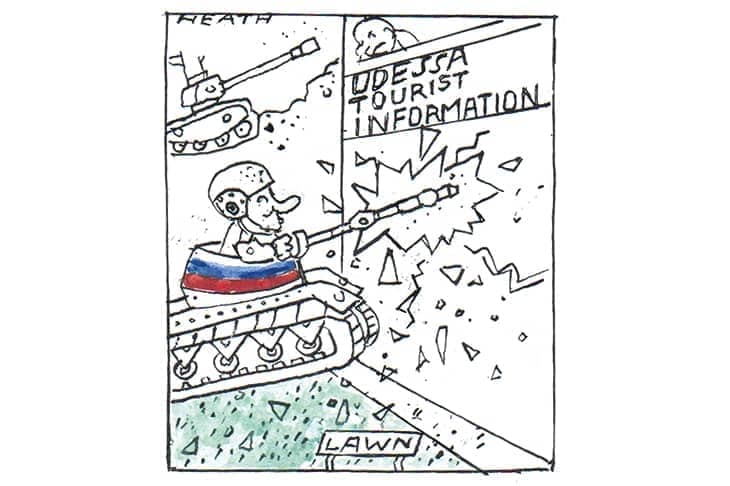‘God Save the Queen’ trended on Ukrainian social media over the weekend. ‘As a Brit in Kiev I have never felt so popular,’ one expat tweeted. Four hundred miles to the south, however, on the once grand, now shabby streets of Odessa, the enthusiasms of the Twittersphere seem remote. There is little optimism that Britain, or indeed any other western country, can do much to halt the tidal wave that locals fear Russia is about to release on them.
At first blush, life might look normal. On the main pedestrian street, Deribasovskaya, horsemen offer children rides on ponies with pink saddles. But in the city’s cafés, markets and large open squares, there is gnawing fear and growing unease. ‘How can we plan for tomorrow?’ asks Slava, a doctor in his thirties, as he drinks tea flavoured with bergamot. We’re in a café named after Nikolai Gogol, author of Dead Souls, the novel satirising political corruption in 19th-century Russia. On the wall next to our table is a small photograph of the writer, supposedly an original, in a too-large frame. ‘Perhaps I should fight, or at least work as a surgeon on the front lines,’ says Slava. ‘But part of me just wants to run away to Poland, or to the West, while I can. I don’t want to be the frog in the boiling water who doesn’t jump until it is too late.’
In the famous 1925 Eisenstein film, Battleship Potemkin, the Potemkin steps in Odessa are turned into a river of human terror and death as Tsarist guards indiscriminately shoot down fleeing men, women and children. Now those same steps, the most famous landmark of this southern Ukrainian city, are almost empty except for a few thickset men in black leather jackets smoking cigarettes and talking furtively.








Comments
Join the debate for just £1 a month
Be part of the conversation with other Spectator readers by getting your first three months for £3.
UNLOCK ACCESS Just £1 a monthAlready a subscriber? Log in